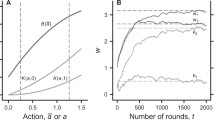Abstract.
In physical models it is well understood that the aggregate behaviour of a system is not in one to one correspondence with the behaviour of the average individual element of that system. Yet, in many economic models the behaviour of aggregates is thought of as corresponding to that of an individual. A typical example is that of public goods experiments. A systematic feature of such experiments is that, with repetition, people contribute less to public goods. A typical explanation is that people “learn to play Nash” or something approaching it. To justify such an explanation, an individual learning model is tested on average or aggregate data. In this paper we will examine this idea by analysing average and individual behaviour in a series of public goods experiments. We analyse data from a series of games of contributions to public goods and as is usual, we test a learning model on the average data. We then look at individual data, examine the changes that this produces and see if some general model such as the EWA (Expected Weighted Attraction) with varying parameters can account for individual behaviour. We find that once we disaggregate data such models have poor explanatory power. Groups do not learn as supposed, their behaviour differs markedly from one group to another, and the behaviour of the individuals who make up the groups also varies within groups. The decline in aggregate contributions cannot be explained by resorting to a uniform model of individual behaviour. However, the Nash equilibrium of such a game is a total payment for all the individuals and there is some convergence of the group in this respect. Yet the individual contributions do not converge. How the individuals “self-organsise” to coordinate, even in this limited way remains to be explained.
Similar content being viewed by others
References
J. Ledyard, edited by J. Kagel, A. Roth, The Handbook of Experimental Economics (Princeton University Press, 1995)
T. Saijo, H. Yamaguchi, The “spite” dilemma in voluntary contribution mechanism experiments, Technical Work (University of Tsukuba, Japan 1992)
I. Erev, A. Roth, Am. Econ. Rev. 88, 848 (1998)
T. Ho, C. Camerer, X. Wang, Individual differences in EWA learning with partial pay-off information, Forthcoming in The Economic Journal (2006)
D. Mookherjee, B. Sopher, Games and Economic Behavior 19, 97 (1997)
D. Fudenberg, D. Levine, The Theory of Learning in Games (MIT Press, 1998)
C. Camerer, T. Ho, Econometrica 67, 827 (1999)
Y. Cheung, D. Friedman, Individual Learning in Normal Form Games: Some Laboratory Results, Games and Economic Behavior, 19, 46 (1997)
D. Stahl, International Journal of Game Theory 28, 111 (1999)
B. Broseta, Games and Economic Behavior 32, 25 (2000)
T. Page, L. Putterman, B. Unel, The Economic Journal 15, 1032 (2005)
E. Sol, S. Thoron, M. Willinger, Do binding agreements solve the social dilemma? An experiment, Working Paper, GREQAM, Marseille, 2006
N. Vriend, Economics Working Papers 185, Department of Economics and Business, Universitat Pompeu Fabra, 1996
J. Andreoni, Am. Econ. Rev. 85, 891 (1995)
D. Davis, Ch. Holt, Experimental Economics (Princeton University Press, Princeton, N.J, 1993)
C. Keser, Cooperation in Public Goods Experiments, Scientific Series (CIRANO, 2000)
C. Keser, Economics Letters 50 (1996)
M. Sefton, R. Steinberg, Journal of Public Economics 61, 263 (1996)
T. Cason, F. Khan, Journal of Development Economics 58, 1999
W. Hichri, Applied Economics Letters, 13, 969 (2006)
C. Camerer, T. Ho, Journal of Mathematical Psychology 42, 305 (1998)
T. Ho, C. Camerer, J. Chong, Functional EWA: A One-parameter Theory of Learning in Games (unpublished)
Author information
Authors and Affiliations
Corresponding author
Rights and permissions
About this article
Cite this article
Hichri, W., Kirman, A. The emergence of coordination in public good games. Eur. Phys. J. B 55, 149–159 (2007). https://doi.org/10.1140/epjb/e2007-00032-8
Received:
Published:
Issue Date:
DOI: https://doi.org/10.1140/epjb/e2007-00032-8




